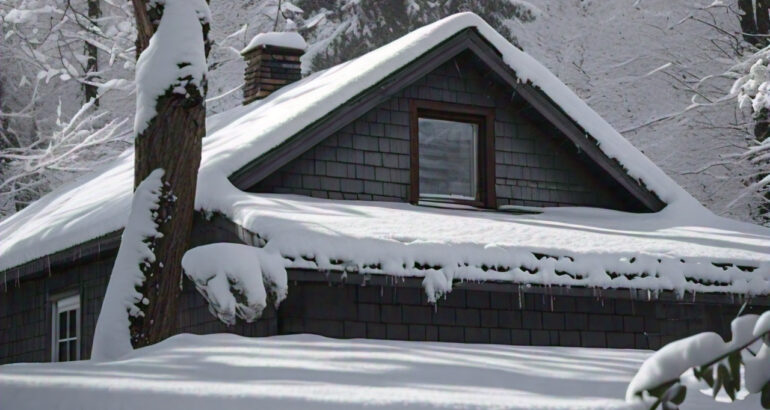
- by John Bittner
When the temperature drops, your home’s first line of defense is its roof. Whether you have a traditional shingle roof or a modern metal roof, proper winterization can save homeowners from costly damage caused by the harsh winter months. A little preparation goes a long way in ensuring your roof lasts through the season without a hitch.
This guide is your complete winter roof maintenance checklist, featuring key steps to protect your roof, tips on when to call a professional roofing company, and what to do in case of unexpected emergencies.
Understanding the Effects of Winter on Roofs
Winter weather can pose significant challenges to the integrity of your roof. Snow, ice, and fluctuating temperatures can create a perfect storm of wear and tear. Understanding these effects is the first step toward preventing problems.
Common Winter Roof Problems
- Ice Dams
When snow melts on your roof and refreezes along the edges, it forms ice dams. These block proper drainage, causing water to back up and potentially leak into your home.
- Snow Accumulation
Heavy snow can put stress on your roof, potentially causing leaks or structural damage, especially if you have an older or weak roof.
- Condensation Issues
Improper attic insulation and ventilation can lead to moisture buildup, putting your roof at risk of rot or mold growth.
- Damaged Flashing or Shingles
High winds and freezing temperatures can loosen flashing or compromise shingles, leaving gaps for moisture to seep in.
Recognizing these issues early can be the difference between a minor repair and needing a completely new roof.
Winter Roof Maintenance Checklist
Now that you know the risks, the key is preparation. Use this checklist to protect your roof before the first snowflake falls.
1. Inspect for Leaks and Damage
Take a close look at your roof, both inside and out. Look for missing or broken shingles, cracks, or sagging areas. Water stains on your attic ceiling could be signs of leaks needing immediate attention.
2. Clean Gutters and Downspouts
Gutters clogged with leaves and debris can trap water, leading to ice buildup and roof damage. Ensure your gutters are clear, securely attached, and free-flowing.
3. Trim Overhanging Branches
Winter storms can snap branches, causing them to fall onto your roof. Trim overhanging branches well before the start of the season to minimize this risk.
4. Check and Repair Flashing
Flashing seals the gaps around chimneys, skylights, and vents. Damaged flashing can allow snow and water to enter. Inspect and repair any worn or loose sections.
5. Ensure Proper Attic Insulation and Ventilation
Your attic plays a crucial role in maintaining roof health. Adequate insulation prevents heat loss, reducing the chances of ice dams forming. Proper ventilation helps regulate moisture to prevent condensation issues.
6. Examine Roof Accessories
Don’t forget roof-mounted items like satellite dishes, antennas, or solar panels. Ensure they’re secure and properly sealed to avoid damage from wind or moisture.
7. Address Weak Spots (Shingle or Metal Roof Specific)
For shingle roofs, check for curling or cracked shingles that may need replacement. With metal roofs, check for rust or loose screws that could allow moisture in.
Following this checklist can keep your roof in peak condition and give you peace of mind through the winter.
The Importance of Professional Inspection
While many tasks on the checklist can be handled by homeowners, scheduling a professional inspection with a trusted roofing company is highly recommended.
Why Call a Professional?
- Experience and Expertise
Professionals can identify hidden issues you might miss, such as subtle structural damage or weakened supports.
- Preventative Care
Contractors can address potential problems before they turn into costly repairs.
- Safe Snow Removal
Certain tasks, like clearing heavy snow, are safer and more effective when done by trained experts.
Tips for Finding a Reliable Roofing Company
- Look for companies with positive reviews and testimonials.
- Make sure they’re licensed, insured, and offer a warranty for their work.
- Seek recommendations from friends, family, or neighbors.
Emergency Roof Care During Winter
Even with the best preparation, emergencies can happen. Here’s how to handle roof problems that arise midwinter.
1. Spotting Problems
Signs like excessive icicles, sagging ceilings, or damp spots can indicate urgent issues. Address them promptly.
2. Safely Remove Snow from Your Roof
Use a roof rake to carefully remove excess snow—never climb onto a snowy or icy roof yourself. And if the snow load is too heavy, call professionals for help.
3. Temporary Fixes for Leaks
Place a tarp over problem areas until professional repairs can be made. To stop leaks inside, use buckets to catch water and protect your flooring.
Quick action can prevent a minor issue from escalating into significant damage.
Start Winterizing Today and Protect Your Home
Your roof is your home’s shield against winter’s harshest elements. By following the steps in this guide, you’ll reduce the risk of damage and save yourself from expensive repairs.
For the best results, combine DIY tasks with the expertise of a professional roofing company. From inspecting a shingle or metal roof to safely managing snow removal, experts can ensure your home stays protected all season long.
Need assistance getting your roof ready for winter? Schedule a professional inspection with our team today. We’ll help you safeguard your home and ensure your roof is ready to weather the storm.
Your roof deserves the best care—start ticking off your winter preparation checklist today!


